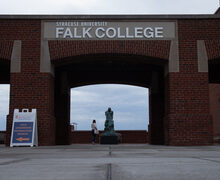Letter to the Editor : Columbus Day marks yearly reminder of Native Americans’ struggles
My earliest memory of Columbus Day is one in which I was making colonial hats in my second-grade classroom. This day was taught to me, as it is to many, as a celebration of the discovery of America, a lesson in patriotism and nationalism. On this day, I was told, everyone is proud to be American.
However, I can no longer hold this lesson true with any sort of credibility.
Columbus is celebrated as the harbinger of colonialism to the Western world. However, to those indigenous to this land, the story of colonialism is nothing to be celebrated. Columbus Day serves as a yearly reminder of the struggle of indigenous people to survive and to keep their culture alive in the wake of colonialism.
With his discovery of the new world, Columbus brought diseases, slavery and cause for vast exploitation. Colonialism effectively dehumanized the indigenous peoples of America. We concern ourselves with the atrocities of more modern genocide and rightfully so. It is easy for us to empathize with the victims, as this sort of atrocity is intangible to many of us, but it is important to remember that on our own soil, genocide is no stranger. Our ancestors were proponents of this very cruelty. And we have yet to let this engrained superiority go.
I am aware that to many Americans treatment of Native Americans and their culture is a non-issue. As a privileged individual, I must rectify this notion.
I was fortunate enough to observe this oppression firsthand as I was growing up. I have spent most of my life near a reservation in Oregon. My earliest memory of Native American tradition is the half-time performance that occurs in the middle of my hometown’s rodeo — the Pendleton Round-Up. This rodeo has functioned to keep the ‘spirit of the West’ alive. The frontier authenticity of this high-desert town in eastern Oregon is nearly unmatched. Nevertheless, in this cowboy town no tradition is truer than that of Native American oppression.
During the weeklong rodeo Native Americans are paid to perform and to inhabit a tepee village behind the Round-Up grounds for spectators to view the ‘Indian portion of the show,’ as the rodeo announcers put it.
While many people don’t recognize this ‘show’ as a serious degradation, I can tell you firsthand that the tepee villagers live their lives as normally as we do — they live in houses (though on the reservation), they attend public school, they shop in the same grocery store and eat at the same restaurants. It is really no spectacle at all.
Though some believe this helps to keep the tradition and culture alive, and it may, there is something to be said about the Round-Up association spending $8.5 million in renovation efforts, gearing up for the centennial in 2010. Yet, not a single dollar was spent to renovate the tepee village or the so-called ‘NDN‘ seating section — where Native Americans can sit and watch the rodeo for free in the scorching sun, while the rest of the bleachers are shaded.
This Columbus Day I urge you to let go of the myth surrounding Columbus and his heroism. I encourage you to take a trip to the Onondaga Nation Reservation, just outside Syracuse. This Columbus Day, take it upon yourself to celebrate the history of this nation — the survival of the indigenous people and their culture.
Kaycie Miltenberger
Junior political science and public relations major
Published on October 9, 2011 at 12:00 pm




